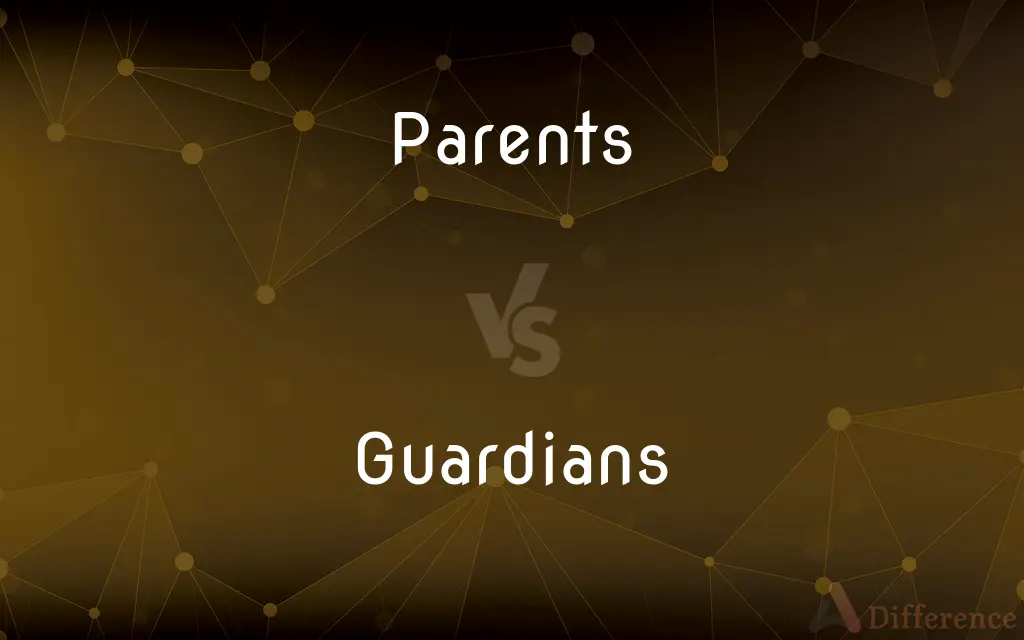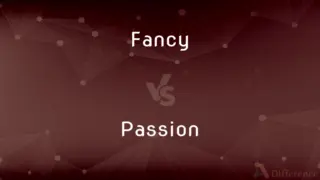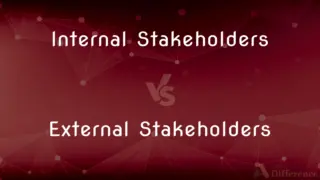Parents vs. Guardians — What's the Difference?
By Tayyaba Rehman — Published on October 1, 2023
"Parents" are biological or adoptive progenitors, while "Guardians" are individuals legally assigned to care for someone, often when parents cannot.

Difference Between Parents and Guardians
Table of Contents
ADVERTISEMENT
Key Differences
"Parents" and "Guardians" both play crucial roles in a child's life, yet their roles, rights, and responsibilities differ. Parents are individuals who give birth to or adopt a child. They have natural rights and obligations towards their offspring, often encompassing emotional, financial, and educational responsibilities.
Guardians, on the other hand, are individuals or entities legally appointed to care for a person—usually a minor—and/or manage their property. While parents automatically have legal rights and responsibilities toward their child, guardianship might be necessary when parents are unable to fulfill their roles due to reasons like death, incapacity, or legal complications.
Notably, while all parents have the potential to be guardians, not all guardians are parents. For instance, a close relative, family friend, or even a state-appointed individual could become a guardian if deemed in the best interest of the child.
Additionally, the term "parents" primarily indicates a biological or familial bond. In contrast, "guardians" centers around legal responsibility and might not have any blood relation to the individual under their care. The distinction between these terms becomes vital in legal, educational, and medical scenarios.
Lastly, the role of guardians may be temporary or long-term, depending on the circumstances leading to their appointment. Parents, on the other hand, retain their status for life, even if they do not have custody or active roles in their child's life.
ADVERTISEMENT
Comparison Chart
Origin
Biological or through adoption
Legal appointment
Relationship
Biological or familial bond
May or may not have a familial connection
Rights & Responsibilities
Natural and automatic
Assigned by a court or legal document
Duration
Lifelong relationship
Can be temporary or permanent based on legal stipulation
Primary Role
Care, upbringing, and emotional support
Legal care, potentially including financial management
Compare with Definitions
Parents
Individuals who biologically produce offspring.
The parents attended the school meeting.
Guardians
A person legally placed in charge of the affairs of a minor.
The court appointed her aunt as the guardian.
Parents
Those who adopt and raise a child.
The couple became proud parents after adopting a baby girl.
Guardians
An individual who protects or defends.
The lioness is a fierce guardian of her cubs.
Parents
A source or cause; originator.
The mountain range is the parents of many rivers.
Guardians
A person in charge of something or someone for protection.
He was named the guardian of the ancient scrolls.
Parents
The protector or guardian of a group or community.
The village elders acted as parents to the entire community.
Guardians
An entity overseeing the welfare of an institution or community.
The board members are the guardians of the college's reputation.
Parents
An individual or thing from which something is descended.
The old tree is the parent to many saplings around it.
Guardians
A person responsible for ensuring another's well-being.
As his brother's guardian, he ensured all his needs were met.
Parents
A female person whose egg unites with a sperm or a male person whose sperm unites with an egg, resulting in the conception of a child or the birth of a child.
Guardians
One that guards, watches over, or protects.
Parents
A female person who is pregnant with or gives birth to a child except when someone else has legal rights to the child.
Guardians
One who is legally responsible for the care and management of the person or property of an incompetent or minor.
Parents
A person who adopts a child.
Guardians
See guardian ad litem.
Parents
A person who raises a child.
Guardians
A superior in a Franciscan monastery.
Parents
An ancestor; a progenitor.
Guardians
Plural of guardian
Parents
An organism that produces or generates offspring.
Parents
A guardian; a protector.
Parents
A parent company.
Parents
A source or cause; an origin
Despair is the parent of rebellion.
Parents
To act as a parent to; raise and nurture
"A genitor who does not parent the child is not its parent" (Ashley Montagu).
Parents
To cause to come into existence; originate.
Parents
To act as a parent.
Parents
Plural of parent
I like hanging out with my parents, but my friends think it's weird.
Common Curiosities
Are all parents automatically guardians of their children?
Yes, parents naturally have guardianship rights over their children unless legally revoked.
Can someone other than a parent be a guardian?
Yes, relatives, family friends, or state-appointed individuals can be guardians.
Do guardians always have custody of the child?
Not always; guardianship can relate to legal decisions, property management, or overall well-being.
Can parents lose their guardianship rights?
Yes, due to reasons like incapacity, legal complications, or if deemed unfit.
Is adoption the same as gaining guardianship?
No, adoption creates a permanent parent-child relationship, while guardianship can be temporary.
Do parents always have a biological relation to the child?
No, parents can be biological or adoptive.
Can a person be both a parent and a guardian?
Yes, parents are naturally guardians, but they can also be legally appointed as such.
Is the role of a guardian limited to minors?
No, guardians can be appointed for adults who are incapacitated or unable to make decisions.
Can parents be guardians for adults?
Yes, if an adult child has special needs or is incapacitated, parents can be guardians.
What's the primary role of a guardian?
To care for and make decisions in the best interest of the individual under their charge.
How does one become a guardian?
Guardianship is typically granted through legal processes and court decisions.
Do parents' rights supersede those of guardians?
Typically, yes, but if guardianship is granted due to parental unfitness, the guardian's rights may prevail.
Can guardianship be revoked?
Yes, based on changing circumstances or court decisions.
Can there be more than one guardian for an individual?
Yes, multiple guardians can be appointed for different aspects of an individual's well-being.
Can a guardian be an institution?
Yes, institutions or entities can be appointed guardians in some cases.
Share Your Discovery

Previous Comparison
Fancy vs. Passion
Next Comparison
Internal Stakeholders vs. External StakeholdersAuthor Spotlight
Written by
Tayyaba RehmanTayyaba Rehman is a distinguished writer, currently serving as a primary contributor to askdifference.com. As a researcher in semantics and etymology, Tayyaba's passion for the complexity of languages and their distinctions has found a perfect home on the platform. Tayyaba delves into the intricacies of language, distinguishing between commonly confused words and phrases, thereby providing clarity for readers worldwide.
















































